Entretien avec
Gary Daniels
Existe aussi en Version Française
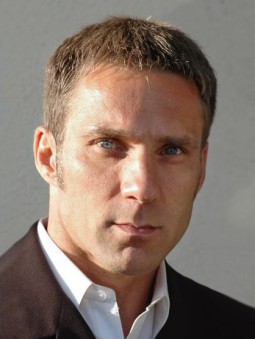
B-movie action star Gary Daniels is familiar to many thanks to his performance in the live-action film "Fist of the North Star": but whatever you think of this movie, when it comes to martial arts, Gary is the real deal. After working in the Philippines and Hong Kong, he became one of the most prominent straight-to-video icons of the 1990s. Mr. Daniels was kind enough to grant us his time and review his own career, with frankness and lucidity.
Interview conducted by John Nada in February 2008.
To start with, could you tell us in a few words what was the chain of events that led you from the martial arts world to the movie industry? In fact, we know that except for a bit part in a "Miami Vice" episode, you really started your career in the film industry in the Philippines: how did you get on the set of "Final Reprisal"? Jim Gaines (James L.M. Gaines Jr.) was also an actor in "Final Reprisal", and then directed what was your second film, "The Secret of King Mahis Island", which remains unknown in Europe and in the USA. What are your memories of Jim, of these first two films and of your staying in the Philippines?
I think most people know that I started martial arts in England at around the age of 8 or 9 years old. I first went to the U.S in my early 20's where I got involved in acting classes and started doing commercials and small parts before going to the Philippines when I was around 23/24 years old, which is where I met Wilson Tieng who was at that time running Solar films that signed me to a 2 year contract. It was Wilson that introduced me to the director Teddy Chiu [Nanarland: alias Ted Johnson alias Teddy Page. For the release of "Final Reprisal", Teddy Chiu used the pseudonym "Ted Hemingway"] and James (Jimmy) Gaines who was the writer of 'Final Reprisal', the first movie that I starred in, in the P.I.
 From the left to the right: Teddy Chiu, Max Thayer and Jim Gaines (the photo has been taken by Nick Nicholson).
From the left to the right: Teddy Chiu, Max Thayer and Jim Gaines (the photo has been taken by Nick Nicholson).
Obviously at that time I was very naive about the film industry so Jimmy became a kind of mentor and good friend that showed me the ropes. He showed me around Manila and started to help shape me as an actor. Jimmy is a very likable person as he has a great sense of humor and a very calm, mellow personality so it was easy for us to get along. I was young and impatient back then so Jimmy was a good foil to my personality. I spent 2 years in the P.I and they were 2 of the best years of my life. 'Final Reprisal' wasn't a great film but I had the time of my life making the film and working with Teddy, Jimmy and a lot of other ex pats, ex military guys living and working in the P.I. I also learned a lot about the realities of film making that you can't learn in an acting class.
The 2nd film I did was called 'The Secret of King Mahis Island' which was supposed to be an Indiana Jones style action/adventure film but it did not go so well. The original director quit after about 1 week and Jimmy took over but there were many problems and the film turned out terrible. It is not surprising and I am glad that it never received a wide distribution.

After these shootings in the Philippines, you then started to do films in the USA through Cine Excel, a small US company linked to Filipino company Kinavesa/Silver Star, owned by a Chinese businessman named K. Y. Lim (who produced films you appear in like "Capital Punishment", "American Streetfighter" or "Final Impact"). Is it Jim Gaines (who worked a lot for him) who introduced you to Mr. Lim? Do you know more about the association between Cine Excel and K. Y. Lim?
I first met Kimmie Lim in the P.I. before I had met Wilson Tieng. Originally I went to the P.I because my girlfriend at the time had gone to the Philippines and met a director named Wilfredo Lim, she gave him my pictures and showed him a tape of me training so he said if I went to the P.I he would "make me a star", so that is why I went there, but it turns out that this guy thought I was a rich American that was going to finance his films, so when he realized I wasn't, he cut off contact with me. As I was already in the P.I., I started going to meet different producers and Kimmie was one of the 1st I met. He offered me the role of an extra in one of his films and I turned it down. Back in the U.S., I had gone to the American Film Market to visit Kimmie Lim and David Huey was in his booth, that is where they discussed using me for some movies here in the U.S. At that time I was waiting tables and teaching martial arts so a chance to work in films again was welcomed.
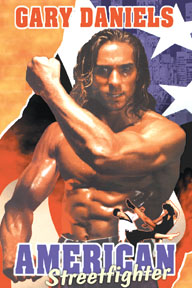
So, you made several films with Cine Excel and continued to work with them for several years. Actor Mel Novak, who also worked with Cine Excel on several films, described the company's CEO David Huey as someone who always made the best out of his limited budgets. Was that also your impression? How was the work with Mr. Huey and the working atmosphere on the set of an independent production company like Cine Excel? You came back to Cine Excel in 2006 to star in "Reptilicant", almost ten years after your last film with them. Do you have any thoughts about that last opus?
David Huey is a good man and again we quickly became friends. As Mel Novak put it, 'David is someone who gets the most out of his budgets', and those budgets were very small. 'Capital Punishment' was the first film we did and I think David's contract with Kimmie said there must be no more than 15 minutes of dialogue in the film. So we shot about 42 fight scenes in 3 weeks, it was physically very demanding. Looking back I would say that I should never have done those 3 movies as I believe they hurt my career, but it was all a learning experience and I had a great relationship with David that continues to this day. I agreed to do 'Reptilicant' because of that relationship, although once again it was not the best career choice I could have made.

On "Capital Punishment", your final fight against Tadashi Yamashita (alias Bronson Lee, the name he used in some bruceploitation movies) remains the highlight of the film. How was the work with Yamashita, and what did you think of his skills in martial arts?
Tadashi Yamashita was a friend of my sifu and is one of the modern day karate legends. So getting to work with him was an honor, he is very talented and I thoroughly enjoyed working with him. I let him choreograph most of the end fight and he did a good job.

You got a highly memorable part in "City Hunter", with a fight against no less than Jackie Chan mocking the video game "Street Fighter 2". We guess you must have put a lot of effort and motivation in this film, and in that scene in particular. What memories do you keep of this shooting?
'City Hunter' was a great experience which again came early for me in my career. I would love to have worked with Jackie once I had become a little more seasoned. As it was I had been a huge Jackie Chan fan since I was about 15 or 16 years old so when I got the call to work with him I was thrilled. We spent almost 2 weeks shooting in Japan on a cruise Liner and then about 3 and a half months in Hong Kong and the whole experience was very positive. For me it was like going to film school, even the days I was not working I would go to the set to watch and learn. Doing the fight scenes were very physically demanding as they demand perfection so you have to do so many takes until they get the shot they want. My opening scene where I had to do the splits in slow motion took so many takes I could hardly walk for 2 days afterwards. The 'Streetfighter' scene was a lot of fun but a lot of hard work. When they put me on the machine that spun me around I almost threw up. And I saw other Chinese stuntmen get carried of the set after the physical demands of some of the wire work.
Still on "City Hunter", what are your memories of fellow accomplished-martial-artist-turned-actor Richard Norton? Mike Abbott told us Chinese actress Joey Wong was a bit of a prima donna on the set... would you confirm?
It was good to have Richard Norton around at that time as he is one of the nicest guys you will ever meet and also he had already had a lot of experience working in Hong Kong films, so his knowledge and advice was very helpful. (In fact I knew Richard before the shoot as we both used to work out at the gym of Benny Urquidez. When I used to train at Benny's gym, I trained with a lot of good people including Don "The Dragon" Wilson and Benny, Peter Cunningham, Richard Norton and many others.)
I don't have any stories to relate regarding Joey Wong except that she was always very professional during our scenes. If she seemed a little stand offish, well I don't expect that any famous Chinese actress is going to want to hang out with the gweilo actors, it is not their way and you have to appreciate their culture without making judgment.
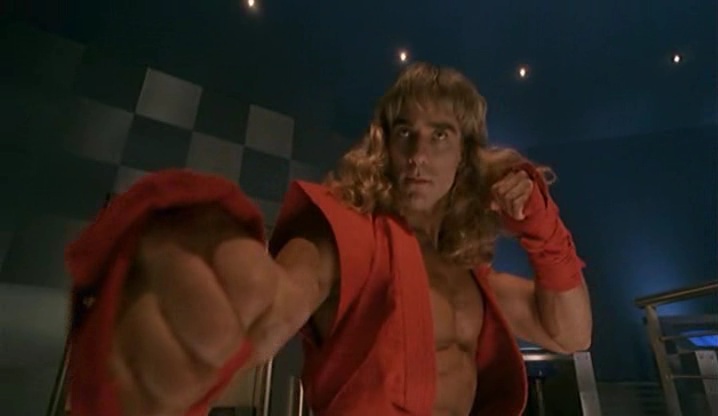
You did films in the Philippines, in Hong Kong ("Mission of Justice", "City Hunter"), in Japan ("Gedo"), maybe soon in Thailand ("The Sanctuary"), and of course in the USA... which way of working do you prefer, Western or Eastern style? According to your own experience, what would be the main characteristics, or advantages and disadvantages, of Western and Eastern's ways to make a film?
There are a few obvious differences between the way films are made in the east and in the west. From my experience and the films I have worked on, in Asia they tend to pay more attention to action and the fights, rather than the scripts, drama and dialogue and character development. Whereas in the West it has been the other way around. But I have seen Asian films with great stories, drama and good acting so I cannot generalize, I can only talk about the films I have worked on. Plus I definitely think the quality of Asian films has come a long way since the 90's. It is important to have different styles of film making around the world so you can appreciate the differences, it would be boring if everyone made films the same way. You cannot appreciate what you like in the absence of that which you don't like.
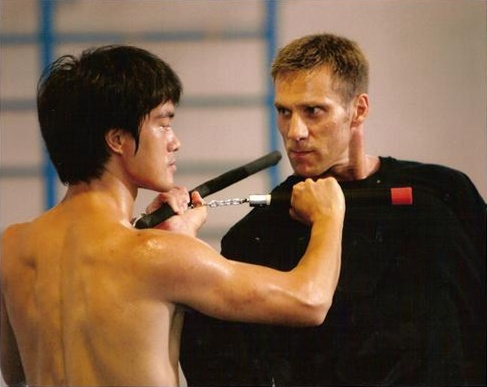
As far as your martial arts background is concerned, we know you studied Mongolian Kung Fu, Tae Kwon Do, Kickboxing, Muay Thai, Sillum Wong ka Kune, and also tried Taijutsu and Aikido. In a few words, you have a very spectacular and cinematic fighting style with lots of fast, high kicks and powerful punches. Who do you think were the directors who made the best use of your abilities? In which film(s) do you feel you gave your best martial arts performance?
On 'Bloodmoon' Tony Leung and his team did a very good job with the action directing, although I feel that the Chinese always try to get the westerners to adapt to the Chinese way of moving rather than trying to adapt the westerners' way of moving into their style of choreography. A 185 lb westerner will never move the same way as a 140 lb Chinese. I think Isaac Florentine [Nanarland: the director of 'Cold Harvest'] is one of the few western directors that appreciates martial arts action and knows how to get a good fight on the screen. He always makes sure he works with top class choreographers, like Koichi Sakamoto, Andy Cheng and J.J Perry. I have worked with my sifu Winston Omega whose choreography I find to be perfect for me and very entertaining but when we have worked together we have never had a director that understands what our vision is and has never allowed us to commit the fight to film how we think it should be done.

On the opposite, we have read you were sometimes unhappy with the work done by fight choreographers or editors. Would you have examples of potentially good fight scenes eventually altered by directors or ruined in the editing process? In a general way, were you entitled to have your say in fight choreographies, and make the directors benefit from your experience?
I have choreographed quite a few of my films and as I mentioned before, so has my sifu, but a lot of the time my vision does not end up on the screen because I have not had a say in the choice of camera lenses, the angles or the editing process. This is a big difference between Hong Kong and the west. In Asia the action director gets to call the shots on the fight scenes. I feel that 'Fist of the Northstar' could have had much better fights had my teacher and I been given more control, also 'White Tiger', 'City of Fear', 'Queens Messenger'.
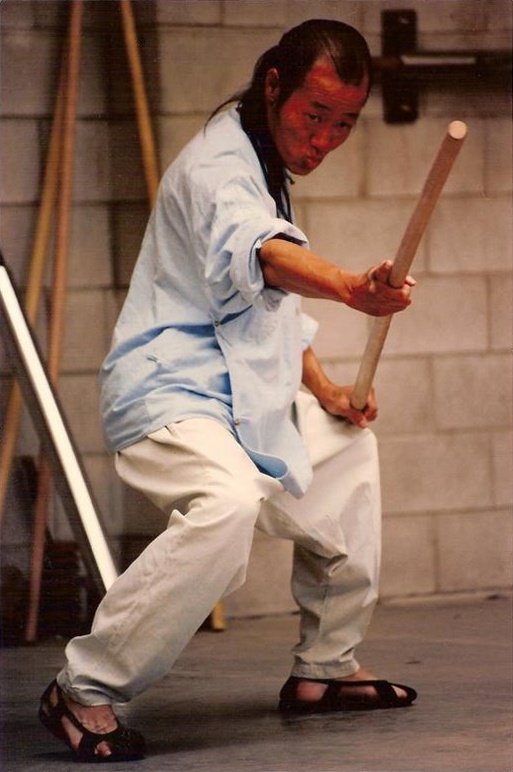 Gary's sifu Winston Omega.
Gary's sifu Winston Omega.
On "Submerged", you worked with Steven Seagal as one of the main bad guys he fought. Your fight scene against him is surprisingly short and a bit underwhelming. Do you know if there was perhaps a longer version shot that was ultimately edited down?
'Submerged' was not one of the highlights of my career! Originally when I was hired my part was much bigger, but for some reason or another Mr Seagal cut my part down so much it could have been played by a local Bulgarian stunt man rather than spending the money to fly me out there. The original fight that had been choreographed by the action coordinator Steve Griffin and the local guys was an excellent fight, very long and full of a variety of techniques and weapons so I was really looking forward to shooting it. But Mr Seagal decided to cut it out and he himself choreographed what you see in the end product. Every lead action actor has their own way of doing things, whether it is Steven Seagal, Jackie Chan, Van Damme, Jet Li, so when you go to work with any of these guys you have to realize it is going to be done their way, that's how they put their own individual mark on their films.
[Nanarland: Apparently it was not the first time. On his previous film, "Retrograde", it seems Gary was initially offered the main bad guy part, but that Dolph Lundgren changed that at the last minute. As Gary put it, "When you work with these guys they do not give you a chance to really shine".]

You acted in a lot of B-movies, which we know have often very tight budgets. Furthermore, most of them were action films, that is to say films in which you may sometimes have put your life, or at least your health, in danger. Do you have memories of some especially trying, difficult shootings? Have you ever been hurt on a set? Are there stunts you once did on a film that you would refuse to do now?
Often when you work on these low budget action films the schedule is very tight and you can end up working long hours, so more often than not most accidents are the result of fatigue. Personally I like to do as much as I can, that is the fun of it for me. Obviously I leave the more technical stuff like car crashes, full body burns, high falls to the experts, but anything of a physical nature I will always try to do myself. I have received a broken jaw, stitches over my eyes and in my head, all from fight scenes but that is all part of being a martial arts actor, it comes with the job. I have had a squib blow up in my face which was not something I could control but again if you are going to do action films you have to accept this kind of thing.
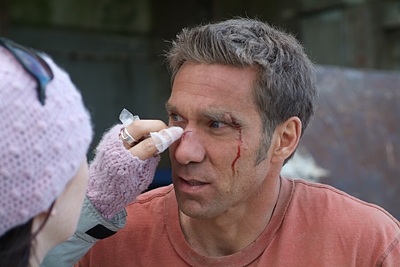
I think the scariest thing that ever happened for me was something very unexpected and seemingly not at all dangerous. When I did my second film in the Philippines, my character was being chased by the bad guys. I just had to jump in a river and swim across it to get away. But when I jumped in, the backpack I was wearing soaked up all the water and I was dragged to the bottom of the river. At first a little panic set in as I was sinking but eventually I got the backpack off and swam to the top but I took a little while to unbuckle the straps so it got a little scary. But I have to say for all the action I have done I have been very lucky to avoid serious injury, which is a testament to the quality of the stunt coordinators and stunt men I have worked with.

You reportedly named one of your son "Kenshiro", which is the name of the character you played in the movie "Fist of the North Star". Is it because this film was important to you?
Not so much that the film was important to me (although they are all important at the time I am shooting them) but he was conceived while I was shooting that film and we would call him that while he was in the belly as a joke and when he was born I hadn't really thought of any other name so it stuck.
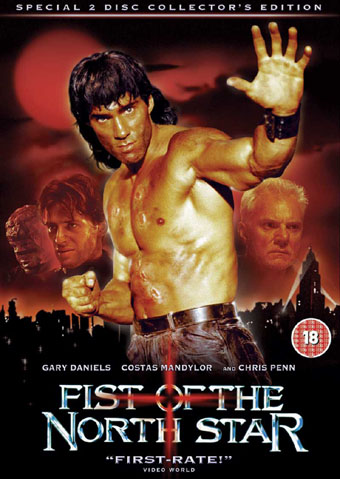
You happened to work several times for P.M. Entertainment (Richard Pepin & Joseph Mehri), for the Cine Excel company, for the Nu Image Films company and many other companies specialized in Direct-To-Video productions (DTV). For the audience, there's such a huge offer in DTVs on the market that these numerous entertaining films tend to appear quite interchangeable, regardless of the name of the director or of the company producing them. As a professional having known these companies from the inside, would you consider working on one DTV production or another as more or less the same ? If no - and to tackle a specific example - how would Pepin & Mehri productions differ from the Nu Image ones?
This is a good question and you have to go back to what kind of movies were selling back in the 90's. Often, what kind of movie that is made is driven by what the buyers/distributors want. If the buyer says he wants an action movie for his country and you make a comedy then he won't buy it and the producer looses money. So back in the 90's the buyers wanted action and so the companies like P.M. and Nu Image were filling that need. This is show business and if you can't run the business side successfully then you will go out of business.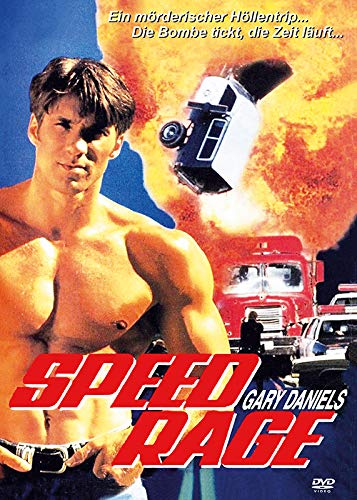
Both P.M and Nu Image were very successful in the 90's. A lot of the scripts I received were very similar, so after a while it got hard to keep coming up with ways to recreate the same kind of action character. The biggest difference was that P.M would shoot nearly all their movies in L.A whereas Nu Image would shoot a lot outside of the country to make use of the strong dollar against weaker local currencies and to get the tax breaks offered by foreign governments.

It seems you didn't work a lot between 2001 and 2005, and even thought of retiring from the film industry. Was it due to a lack of good opportunities or were you just temporarily weary of the film business? What look do you take at the way the film industry, and especially the B-movie industry, is evolving?
I stopped working for a while as I took a self imposed exile as I had been working a lot and as I said I was getting a bit burned out as I was having trouble coming up with fresh ideas for characters. I had some money in the bank and I wanted to focus on my training and spending time with my children. While I was taking that time off a newer younger set of action guys were coming up and these guys had new skills. Nowadays it seems everyone is doing gymnastics with their martial arts and the audience and the producers seem to want this kind of performer. I still train hard 5-6 days a week and keep up my body and martial arts but I will never be one of these guys that will flip in the air twice before I deliver a kick. Nowadays with all the CGI, green screen and wire work, who knows how much work there will be for guys like me that just study the acting and martial arts. I do feel that a lot of the stuff we see nowadays is very repetitive and it would be good to get away from too much gymnastics and wire work, but that is just my opinion.
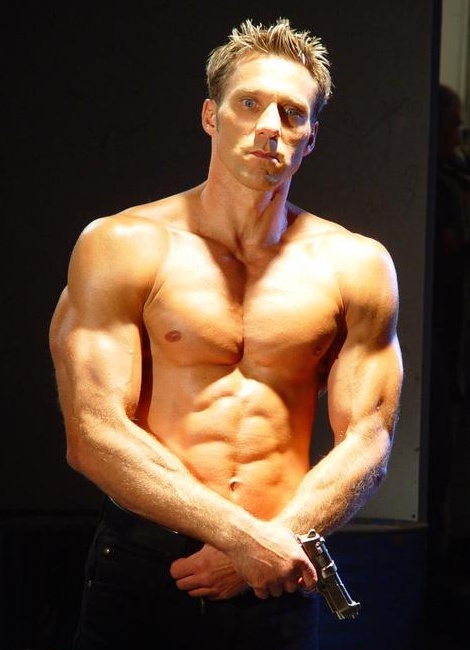
Looking back on all your past experiences on the sets, what are your very best and your very worst memories as an actor? With the hindsight, what look do you take at your career in the movie industry, not just professionally but as a human/life experience?
I have been so very fortunate with my career, it has taken me all around the world, I have met many wonderful people and made a few good friends. It has given me and my family a good, comfortable life style and opened up my mind to what is out there in the world. I think it has helped to make me a better, more open minded person. But I don't believe it is over, I still think the best is yet to come! I don't have any really bad memories, yes I have made some bad choices but those choices are all part of the learning experience, stepping stones to creating who I am today. I have to say that working in Asia, China, Hong Kong, Philippines, Japan have been some of my favorite times as I really enjoy the diverse cultures and wonderful people I have met in those countries.

You are announced in the credits of the "coming soon" Filipino action film "Vengeance of Cleopatra Wong", written, produced and directed by BAS Films boss Bobby A. Suarez, and with actors like Marrie Lee (the original Cleopatra Wong), Vietnamese leggy model Bebe Pham and Jim Gaines. Everybody here at Nanarland look forward to watching this film, so could you please tell us a bit more about it? Do you have other projects in the near future ?
'Vengeance of Cleopatra Wong', as you know, is the brainchild of Bobby Suarez. Bobby had a lot of success with his films in the late 70's and early 80's. Lately he has been having success with the re issue rights for his films around the world. I think this has reignited his passion for the film industry. So he has rewritten some of his earlier classics to update them and has approached me to work with him as we have been friends for many years since my early days in the P.I. Up till now we have not managed to find suitable investors so the search goes on. It will be nice to go back and work in a country that I love and to hook up with old friends and hopefully make a kick ass action film. No one can predict the future but I hope to be working again in the near future. I have one project on the horizon, an action/martial arts film called 'The Sanctuary' which will be shooting in Thailand so hopefully that will lead to more action roles. Lately I have worked on a vampire movie called 'Kiss of the Vampire', a supernatural thriller called 'Cold Earth' and a thriller called 'La Linea' which starred Ray Liotta and Andy Garcia, but it would be nice to get back to making some hard core action/martial arts films. Shortly after the making of this interview, Gary Daniels booked "Tekken", a 40 million dollar film based on the video game and produced by Crystal Sky Pictures.
Shortly after the making of this interview, Gary Daniels booked "Tekken", a 40 million dollar film based on the video game and produced by Crystal Sky Pictures.
On behalf of the whole Nanarland team, and of all our readers who we know will be very glad to come upon this interview, thank you very much for your time, Mr Daniels!
Thank you for your interest and your support.
Merci beaucoup.
Gary Daniels

